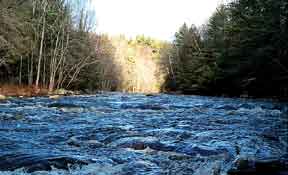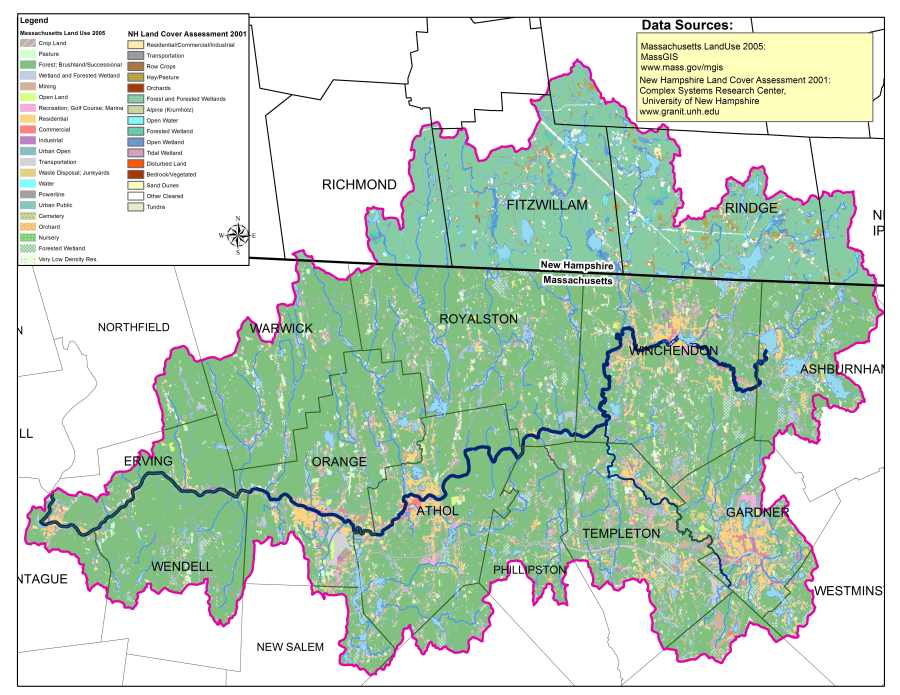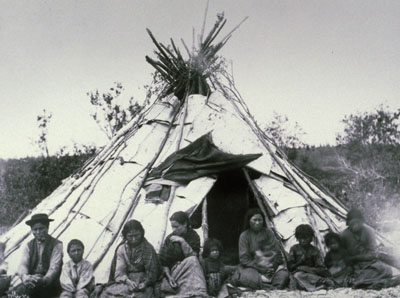Edited by Braeden Hardie
“When thou passeth through the waters I will be with thee, and through the rivers they shall not overflow thee” (Isaiah 43.2)
The occasion (as I thought) of their moving at this time was the English army1, it being near and following them. For they went as if they had gone for their lives, for some considerable way, and then they made a stop, and chose some of their stoutest2 men, and sent them back to hold the English army in play whilst the rest escaped. And then, like Jehu3, they marched on furiously, with their old and with their young: some carried their old decrepit mothers, some carried one, and some another. Four of them carried a great Indian4 upon a bier5; but going through a thick wood with him, they were hindered6, and could make no haste, whereupon they took him upon their backs, and carried him, one at a time, till they came to Banquaug river7.

the river in which Rowlandson crosses.
https://pubs.usgs.gov/fs/fs09303/
Upon a Friday, a little after noon, we came to this river. When all the company was come up, and were gathered together, I thought to count the number of them, but they were so many, and being somewhat in motion, it was beyond my skill. In this travel, because of my wound, I was somewhat favored in my load; I carried only my knitting work and two quarts of parched meal. Being very faint I asked my mistress8 to give me one spoonful of the meal, but she would not give me a taste. They quickly fell to cutting dry trees, to make rafts to carry them over the river: and soon my turn came to go over. By the advantage of some brush which they had laid upon the raft to sit upon, I did not wet my foot (which many of themselves at the other end were mid-leg deep) which cannot but be acknowledged as a favor of God to my weakened body, it being a very cold time. I was not before acquainted with such kind of doings or dangers. “When thou passeth through the waters I will be with thee, and through the rivers they shall not overflow thee” (Isaiah 43.2). A certain number of us got over the river that night, but it was the night after the Sabbath9 before all the company was got over. On the Saturday they boiled an old horse’s leg which they had got, and so we drank of the broth, as soon as they thought it was ready, and when it was almost all gone, they filled it up again.

The first week of my being among them I hardly ate any thing; the second week I found my stomach grow very faint for want of something10; and yet it was very hard to get down their filthy trash; but the third week, though I could think how formerly my stomach would turn against this or that, and I could starve and die before I could eat such things, yet they were sweet and savory to my taste. I was at this time knitting a pair of white cotton stockings for my mistress; and had not yet wrought upon a Sabbath day11. When the Sabbath came they bade me go to work. I told them it was the Sabbath day, and desired them to let me rest, and told them I would do as much more tomorrow; to which they answered me they would break my face. And here I cannot but take notice of the strange providence of God in preserving the heathen. They were many hundreds, old and young, some sick, and some lame; many had papooses12 on13 their backs. The greatest number at this time with us were squaws14, and they traveled with all they had, bag and baggage, and yet they got over this river aforesaid15; and on Monday they set their wigwams16 on fire, and away they went.

much of her time in captivity in a structure that
was likely very similar
On that very day came the English army after them to this river, and saw the smoke of their wigwams, and yet this river put a stop to them. God did not give them courage or activity to go over after us. We were not ready for so great a mercy as victory and deliverance. If we had been God would have found out a way for the English to have passed this river, as well as for the Indians with their squaws and children, and all their luggage. “Oh that my people had hearkened to me, and Israel had walked in my ways, I should soon have subdued their enemies, and turned my hand against their adversaries” (Psalm 81.13-14).
Thank you to Project Gutenburg for providing the digitized version of this text free of charge. Without their generosity, this project would not be possible.
There were numerous intermittent conflicts between Indigenous people in the USA and various colonial powers spanning from the1600s to the early 1900s ↩
Bulky in figure or heavily built ↩
Jehu was the tenth king of the Northern Kingdom of Israel, reigning from 841-814 BCE ↩
Although not politically correct today, Indian was used to describe Indigenous people at the time of Rowlandson’s account ↩
A wooden frame often used to carry a coffin ↩
to cause difficulty or delay ↩
A River in Massachusetts, which is now called Millers River ↩
Rowlandson refers to the woman who ‘owns her’ as her mistress. In this context it means a woman in a position of power ↩
Monday ↩
When someone is experiencing extreme hunger, their body becomes so weak that it does not think it needs nourishment ↩
The Sabbath Day is the day in which Christians reserve for rest and worship. At the time of Rowlandson’s account the concept was a lot more binding than it is today ↩
An Indigenous baby ↩
corrected from ‘at’ ↩
A derogatory term for an Indigenous woman ↩
as said earlier ↩
An Indigenous dwelling made of poles wrapped with bark or hide ↩
